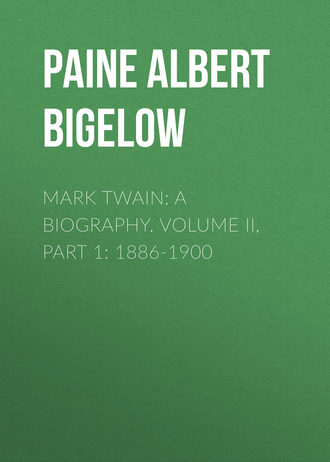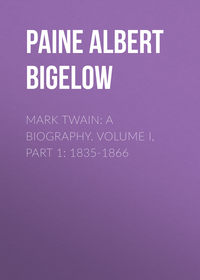
Mark Twain: A Biography. Volume II, Part 1: 1886-1900
CLVI
THE CLOSE OF A GREAT CAREER
The Clemens household did not go to Elmira that year until the 27th of June. Meantime General Grant had been taken to Mount McGregor, near the Adirondacks. The day after Clemens reached Elmira there came a summons saying that the General had asked to see him. He went immediately, and remained several days. The resolute old commander was very feeble by this time. It was three months since he had been believed to be dying, yet he was still alive, still at work, though he could no longer speak. He was adding, here and there, a finishing touch to his manuscript, writing with effort on small slips of paper containing but a few words each. His conversation was carried on in the same way. Mark Twain brought back a little package of those precious slips, and some of them are still preserved. The writing is perfectly legible, and shows no indication of a trembling hand.
On one of these slips is written:
There is much more that I could do if I was a well man. I do not write quite as clearly as I could if well. If I could read it over myself many little matters of anecdote and incident would suggest themselves to me.
On another:
Have you seen any portion of the second volume? It is up to the end, or nearly so. As much more work as I have done to-day will finish it. I have worked faster than if I had been well. I have used my three boys and a stenographer.
And on still another:
If I could have two weeks of strength I could improve it very much. As I am, however, it will have to go about as it is, with verifications by the boys and by suggestions which will enable me to make a point clear here and there.
Certainly no campaign was ever conducted with a braver heart. As long as his fingers could hold a pencil he continued at his task. Once he asked if any estimate could now be made of what portion would accrue to his family from the publication. Clemens's prompt reply, that more than one hundred thousand sets had been sold, and that already the amount of his share, secured by safe bonds, exceeded one hundred and fifty thousand dollars, seemed to give him deep comfort. Clemens told him that the country was as yet not one-third canvassed, and that without doubt there turns would be twice as much more by the end of the year. Grant made no further inquiry, and probably never again mentioned the subject to any one.
When Clemens left, General Grant was sitting, fully dressed, with a shawl about his shoulders, pencil and paper beside him. It was a picture that would never fade from the memory. In a later memorandum he says:
I then believed he would live several months. He was still adding little perfecting details to his book, and preface, among other things. He was entirely through a few days later. Since then the lack of any strong interest to employ his mind has enabled the tedious weariness to kill him. I think his book kept him alive several months. He was a very great man and superlatively good.
This note was made July 23, 1885, at 10 A.M., on receipt of the news that General Grant was dead. To Henry Ward Beecher, Clemens wrote:
One day he put his pencil aside and said there was nothing more to do. If I had been there I could have foretold the shock that struck the world three days later.
It can be truly said that all the nation mourned. General Grant had no enemies, political or sectional, in those last days. The old soldier battling with a deadly disease, yet bravely completing his task, was a figure at once so pathetic and so noble that no breath of animosity remained to utter a single word that was not kind.
Memorial services were held from one end of the country to the other. Those who had followed him in peace or war, those who had fought beside him or against him, alike paid tribute to his memory. Twichell, from the mountains of Vermont, wrote:
I suppose I have said to Harmony forty times since I got up here, "How I wish I could see Mark!" My notion is that between us we could get ourselves expressed. I have never known any one who could help me read my own thoughts in such a case as you can and have done many a time, dear old fellow.
I'd give more to sit on a log with you in the woods this afternoon, while we twined a wreath together for Launcelot's grave, than to hear any conceivable eulogy of him pronounced by mortal lips.
The death of Grant so largely and so suddenly augmented the orders for his Memoirs that it seemed impossible to get the first volume printed in time for the delivery, which had been promised for December 1st. J. J. Little had the contract of manufacture, and every available press and bindery was running double time to complete the vast contract.
In the end more than three hundred thousand sets of two volumes each were sold, and between four hundred and twenty and four hundred and fifty thousand dollars was paid to Mrs. Grant. The first check of two hundred thousand dollars, drawn February 27, 1886, remains the largest single royalty check in history. Mark Twain's prophecy had been almost exactly verified.
CLVII
MINOR MATTERS OF A GREAT YEAR
The Grant episode, so important in all its phases, naturally overshadowed other events of 1885. Mark Twain was so deeply absorbed in this great publishing enterprise that he wasted little thought or energy in other directions.
Yet there are a few minor things that it seems worth while to remember. Howells has told something of the Authors' Reading given for the Longfellow Memorial, an entertainment managed by George Parsons Lathrop, though Howells justly claims the glory of having fixed the price of admission at five dollars. Then he recalls a pleasing anecdote of Charles Eliot Norton, who introduced the attractions.
Norton presided, and when it came Clemens's turn to read he introduced him with such exquisite praises as he best knew how to give, but before he closed he fell a prey to one of those lapses of tact which are the peculiar peril of people of the greatest tact. He was reminded of Darwin's delight in Mark Twain, and how when he came from his long day's exhausting study, and sank into bed at midnight, he took up a volume of Mark Twain, whose books he always kept on a table beside him, and whatever had been his tormenting problem, or excess of toil, he felt secure of a good night's rest from it. A sort of blank ensued which Clemens filled in the only possible way. He said he should always be glad he had contributed to the repose of that great man, to whom science owed so much, and then without waiting for the joy in every breast to burst forth, he began to read.
Howells tells of Mark Twain's triumph on this occasion, and in a letter at the time he wrote: "You simply straddled down to the footlights and took that house up in the hollow of your hand and tickled it."
Howells adds that the show netted seventeen hundred dollars. This was early in May.
Of literary work, beyond the war paper, the "Private History of a Campaign that Failed" (published December, 1885), Clemens appears to have done very little. His thoughts were far too busy with plans for furthering the sale of the great military Memoir to follow literary ventures of his own. At one time he was impelled to dictate an autobiography—Grant's difficulties in his dying hour suggesting this —and he arranged with Redpath, who was no longer a lecture agent and understood stenography, to co-operate with him in the work. He dictated a few chapters, but he was otherwise too much occupied to continue. Also, he was unused to dictation, and found it hard and the result unsatisfactory.
Two open communications from Mark Twain that year deserve to be remembered. One of these; unsigned, was published in the Century Magazine, and expressed the need for a "universal tinker," the man who can accept a job in a large household or in a community as master of all trades, with sufficient knowledge of each to be ready to undertake whatever repairs are likely to be required in the ordinary household, such as—"to put in windowpanes, mend gas leaks, jack-plane the edges of doors that won't shut, keep the waste-pipe and other water-pipe joints, glue and otherwise repair havoc done in furniture, etc." The letter was signed X. Y. Z., and it brought replies from various parts of the world. None of the applicants seemed universally qualified, but in Kansas City a business was founded on the idea, adopting "The Universal Tinker" as its firm name.
The other letter mentioned was written to the 'Christian Union', inspired by a tale entitled, "What Ought We to Have Done?" It was a tale concerning the government of children; especially concerning the government of one child—John Junior—a child who, as it would appear from the tale, had a habit of running things pretty much to his own notion. The performance of John junior, and of his parents in trying to manage him, stirred Mark Twain considerably—it being "enough to make a body's blood boil," as he confesses—and it impelled him to set down surreptitiously his impressions of what would have happened to John Junior as a member of the Clemens household. He did not dare to show the communication to Mrs. Clemens before he sent it, for he knew pretty well what its fate would be in that case. So he took chances and printed it without her knowledge. The letter was published July 16, 1885. It is too long to be included entire, but it is too illuminating to be altogether omitted. After relating, in considerable detail, Mrs. Clemens's method of dealing with an unruly child—the gentleness yet firmness of her discipline—he concludes:
The mother of my children adores them—there is no milder term for it—and they worship her; they even worship anything which the touch of her hand has made sacred. They know her for the best and truest friend they have ever had, or ever shall have; they know her for one who never did them a wrong, and cannot do them a wrong; who never told them a lie, nor the shadow of one; who never deceived them by even an ambiguous gesture; who never gave them an unreasonable command, nor ever contented herself with anything short of a perfect obedience; who has always treated them as politely and considerately as she would the best and oldest in the land, and has always required of them gentle speech and courteous conduct toward all, of whatsoever degree with whom they chanced to come in contact; they know her for one whose promise, whether of reward or punishment, is gold, and always worth its face, to the uttermost farthing. In a word, they know her, and I know her, for the best and dearest mother that lives—and by a long, long way the wisest….
In all my life I have never made a single reference to my wife in print before, as far as I can remember, except once in the dedication of a book; and so, after these fifteen years of silence, perhaps I may unseal my lips this one time without impropriety or indelicacy. I will institute one other novelty: I will send this manuscript to the press without her knowledge and without asking her to edit it. This will save it from getting edited into the stove.
Susy's biography refers to this incident at considerable length. She states that her father had misgivings after he had sent it to the Christian Union, and that he tried to recall the manuscript, but found it too late. She sets down some comments of her own on her mother's government, then tells us of the appearance of the article:
When the Christian Union reached the farm and papa's article in it, all ready and waiting to be read to mama, papa hadn't the courage to show it to her (for he knew she wouldn't like it at all) at first, and he didn't, but he might have let it go and never let her see it; but finally he gave his consent to her seeing it, and told Clara and I we could take it to her, which we did with tardiness, and we all stood around mama while she read it, all wondering what she would say and think about it.
She was too much surprised (and pleased privately too) to say much at first; but, as we all expected, publicly (or rather when she remembered that this article was to be read by every one that took the Christian Union) she was rather shocked and a little displeased.
Susy goes on to tell that the article provoked a number of letters, most of them pleasant ones, but some of them of quite another sort. One of the latter fell into her mother's hands, after which there was general regret that the article had been printed, and the subject was no longer discussed at Quarry Farm.
Susy's biography is a unique record. It was a sort of combined memoir and journal, charming in its innocent frankness and childish insight. She used to keep it under her pillow, and after she was asleep the parents would steal it out and find a tender amusement and pathos in its quaint entries. It is a faithful record so far as it goes, and the period it covers is an important one; for it presents a picture of Mark Twain in the fullness of his manhood, in the golden hour of his fortune. Susy's beginning has a special value here:—[Susy's' spelling and punctuation are preserved.]
We are a very happy family! We consist of papa, mama, Jean, Clara and me. It is papa I am writing about, and I shall have no trouble in not knowing what to say about him, as he is a very striking character. Papa's appearance has been described many times, but very incorrectly; he has beautiful curly grey hair, not any too thick, or any too long, just right; a Roman nose, which greatly improves the beauty of his features, kind blue eyes, and a small mustache, he has a wonderfully shaped head, and profile, he has a very good figure in short he is an extraordinarily fine looking man. All his features are perfect, except that he hasn't extraordinary teeth. His complexion is very fair, and he doesn't ware a beard:
He is a very good man, and a very funny one; he has got a temper but we all of us have in this family. He is the loveliest man I ever saw, or ever hope to see, and oh so absent-minded!
That this is a fair statement of the Clemens home, and the truest picture of Mark Twain at fifty that has been preserved, cannot be doubted. His hair was iron-gray, not entirely white at this time, the auburn tints everywhere mingled with the shining white that later would mantle it like a silver crown. He did not look young for his years, but he was still young, always young—indestructibly young in spirit and bodily vigor. Susy tells how that summer he blew soap-bubbles for the children, filling the bubbles with tobacco smoke; how he would play with the cats, and come clear down from his study on the hill to see how "Sour Mash," then a kitten, was getting along; also how he wrote a poem for Jean's donkey, Cadichon (which they made Kiditchin): She quotes the poem:
KIDITCHIN O du lieb' Kiditchin Du bist ganz bewitchin, Waw- – - -he! In summer days Kiditchin Thou'rt dear from nose to britchin Waw–he! No dought thoult get a switchin When for mischief thou'rt itchin' Waw- – - -he! But when you're good Kiditchin You shall feast in James's kitchin Waw- – - -he! O now lift up thy song Thy noble note prolong Thou living Chinese gong! Waw–he! waw–he waw Sweetest donkey man ever saw.Clemens undertook to ride Kiditchin one day, to show the children how it should be done, but Kiditchin resented this interference and promptly flung him over her head. He thought she might have been listening to the poem he had written of her.
Susy's discovery that the secret of her biography was known is shown by the next entry, and the touch of severity in it was probably not entirely unconscious:
Papa said the other day, "I am a mugwump and a mugwump is pure from the marrow out." (Papa knows that I am writing this biography of him, and he said this for it.) He doesn't like to go to church at all, why I never understood, until just now. He told us the other day that he couldn't bear to hear anyone talk but himself, but that he could listen to himself talk for hours without getting tired, of course he said this in joke, but I've no doubt it was founded on truth.
Susy's picture of life at Quarry Farm at this period is realistic and valuable—too valuable to be spared from this biography:
There are eleven cats at the farm here now. Papa's favorite is a little tortoise-shell kitten he has named "Sour Mash," and a little spotted one "Fannie." It is very pretty to see what papa calls the cat procession; it was formed in this way. Old Minniecat headed, (the mother of all the cats) next to her came aunt Susie, then Clara on the donkey, accompanied by a pile of cats, then papa and Jean hand in hand and a pile of cats brought up in the rear, mama and I made up the audience.
Our varius occupations are as follows. Papa rises about 1/2 past 7 in the morning, breakfasts at eight, writes, plays tennis with Clara and me and tries to make the donkey go, in the morning; does varius things in P.M., and in the evening plays tennis with Clara and me and amuses Jean and the donkey.
Mama rises about 1/4 to eight, breakfasts at eight, teaches Jean German reading from 9-10; reads German with me from 10-11. Then she reads studdies or visits with aunt Susie for a while, and then she reads to Clara and I till lunch time things connected with English history (for we hope to go to England next summer) while we sew. Then we have lunch. She studdies for about half an hour or visits with aunt Susie, then reads to us an hour or more, then studdies writes reads and rests till supper time. After supper she sits out on the porch and works till eight o'clock, from eight o'clock to bedtime she plays whist with papa and after she has retired she reads and studdies German for a while.
Clara and I do most everything from practicing to donkey riding and playing tag. While Jean's time is spent in asking mama what she can have to eat.
It is impossible, at this distance, to convey all that the farm meant to the children during the summers of their infancy and childhood and girlhood which they spent there. It was the paradise, the dreamland they looked forward to during all the rest of the year. Through the long, happy months there they grew strong and brown, and drank deeply of the joy of life. Their cousins Julia, Jervis, and Ida Langdon ranged about their own ages and were almost their daily companions. Their games were mainly of the out-of-doors; the woods and meadows and hillside pastures were their playground. Susy was thirteen when she began her diary; a gentle, thoughtful, romantic child. One afternoon she discovered a wonderful tangle of vines and bushes between the study and the sunset—a rare hiding-place. She ran breathlessly to her aunt:
"Can I have it? Can Clara and I have it all for our own?"
The petition was granted, of course, and the place was named Helen's Bower, for they were reading Thaddeus of Warsaw and the name appealed to Susy's poetic fancy. Then Mrs. Clemens conceived the idea of building a house for the children just beyond the bower. It was a complete little cottage when finished, with a porch and with furnishings contributed by friends and members of the family. There was a stove—a tiny affair, but practical—dishes, table, chairs, shelves, and a broom. The little house was named Ellerslie, out of Grace Aguilar's Days of Robert Bruce, and became one of the children's most beloved possessions. But alas for Helen's Bower! A workman was sent to clear away the debris after the builders, and being a practical man, he cut away Helen's Bower—destroyed it utterly. Susy first discovered the vandalism, and came rushing to the house in a torrent of sorrow. For her the joy of life seemed ended, and it was long before she could be comforted. But Ellerslie in time satisfied her hunger for retreat, became, in fact, the nucleus around which the children's summer happiness centered.
To their elders the farm remained always the quiet haven. Once to Orion's wife Clemens wrote:
This is a superb Sunday . . . .
The city in the valley is purple with shade, as seen from up here at the study. The Cranes are reading and loafing in the canvas- curtained summer-house, fifty yards away, on a higher (the highest) point; the cats are loafing over at Ellerslie, which is the children's estate and dwelling house in their own private grounds (by deed from Susie Crane), a hundred yards from the study, among the clover and young oaks and willows. Livy is down at the house, but I shall now go and bring her up to the Cranes to help us occupy the lounges and hammocks, whence a great panorama of distant hills and valley and city is seeable. The children have gone on a lark through the neighboring hills and woods, Susie and Clara horseback and Jean, driving a buggy, with the coachman for comrade and assistant at need. It is a perfect day indeed.
The ending of each year's summer brought only regret. Clemens would never take away all his things. He had an old superstition that to leave some article insured return. Mrs. Clemens also left something—her heart's content. The children went around bidding various objects good-by and kissed the gates of Ellerslie too.
CLVIII
MARK TWAIN AT FIFTY
Mark Twain's fiftieth birthday was one of the pleasantly observed events of that year. There was no special celebration, but friends sent kindly messages, and The Critic, then conducted by Jeannette and Joseph Gilder, made a feature of it. Miss Gilder wrote to Oliver Wendell Holmes and invited some verses, which with his never-failing kindliness he sent, though in his accompanying note he said:
"I had twenty-three letters spread out on my table for answering, all marked immediate, when your note came."
Dr. Holmes's stanzas are full of his gentle spirit:
TO MARK TWAIN(On his fiftieth birthday)
Ah, Clemens, when I saw thee last, We both of us were younger; How fondly mumbling o'er the past Is Memory's toothless hunger! So fifty years have fled, they say, Since first you took to drinking; I mean in Nature's milky way Of course no ill I'm thinking. But while on life's uneven road Your track you've been pursuing, What fountains from your wit have flowed What drinks you have been brewing! I know whence all your magic came, Your secret I've discovered, The source that fed your inward flame, The dreams that round you hovered. Before you learned to bite or munch, Still kicking in your cradle, The Muses mixed a bowl of punch And Hebe seized the ladle. Dear babe, whose fiftieth year to-day Your ripe half-century rounded, Your books the precious draught betray The laughing Nine compounded. So mixed the sweet, the sharp, the strong, Each finds its faults amended, The virtues that to each belong In happiest union blended. And what the flavor can surpass Of sugar, spirit, lemons? So while one health fills every glass Mark Twain for Baby Clemens!OLIVER WENDELL HOLMESFrank R. Stockton, Charles Dudley Warner, and Joel Chandler Harris sent pleasing letters. Warner said:
You may think it an easy thing to be fifty years old, but you will find it's not so easy to stay there, and your next fifty years will slip away much faster than those just accomplished.
Many wrote letters privately, of course, and Andrew Lang, like Holmes, sent a poem that has a special charm.
FOR MARK TWAIN To brave Mark Twain, across the sea, The years have brought his jubilee. One hears it, half in pain, That fifty years have passed and gone Since danced the merry star that shone Above the babe Mark Twain. We turn his pages and we see The Mississippi flowing free; We turn again and grin O'er all Tom Sawyer did and planned With him of the ensanguined hand, With Huckleberry Finn! Spirit of Mirth, whose chime of bells Shakes on his cap, and sweetly swells Across the Atlantic main, Grant that Mark's laughter never die, That men through many a century May chuckle o'er Mark Twain!Assuredly Mark Twain was made happy by these attentions; to Dr. Holmes he wrote:









